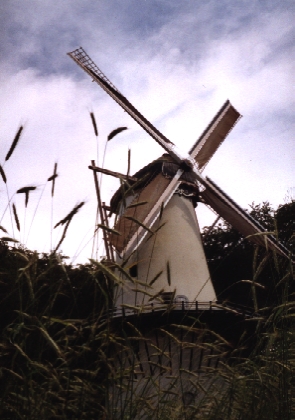Weit
A kind of corn of which fine bakery (cakes, cookies) and bread is made. It only grows on rich soils that are not too wet. De Weslanan are famous for this kind. So are De Gouden Velden and large areas of Overveer.Kaurn
Another kind of corn, used for bread and -mainly- beer. It grows almost anywhere. Whoever has a large garden might think of growing it.Spelte
Yet another kind of corn, used to make bread and porridge. It grows in the warmer parts of Daleth: Overveer and Salamandran. In De Erflanden it is sold as an expensive corn. People claim it tastes a bit salt and bitter compared to Kaurn.Aút
And yet another kind of corn, also used for bakery and porridge, and horses are rather fond of it too. It grows on quite wet soils that doesn’t have to be rich. It grows near the banks of Kristalmeer.Krip
The cold, wet lands of Fanigawi are not really suited for crowing crops. The only kind of wheat that really flourishes here is the Krip.Krip has been imported to Daleth, as a delicatessen.
In the swamps of Gamoor some endeavours farmers have tried to grow their own krip, but apart from small fields, they were unable to grow any for the masses. The Dalethian krip is sold for a lot of money on the markets of Nieuw-Gamoor.
 |
Mills
Wheat and corns are very important in Daleth. So is the grinding to make it into flour. To protect the wheat trade and to make sure there will always be enough wheat and flour, the whole business is in the hands of the government.The Department of Agricultural Affairs (DAA) can force farmers to sew corn and millers to grind it, and the bakers can be forced to bake bread. Of course, they will be paid for it; if the free market doesn’t pay enough the DAA guarantees a good price.
In order to give the right advice about what to grow, the DAA has an administration of who grows what at which field. Especially in times of bad harvests and hunger, the DAA needs to make a decision between as much corn as possible and not exhausting the soil. Normally, the farmers can decide themselves what to grow on their fields, or the owner of the land tells them what to grow.
The corns are ground in mills. These are either windmills or water mills, equipped with grinding stones made for grinding corns. Other mills can have stones for grinding seeds into oil. Mills with the possibility of more grinding spots are requested to keep one set of stones free for grinding corn. Most oil-mills have an extra set of stones for grinding corn in an emergency.
The water mills are usually the larger mills, where all kind of industry takes place. The water power is strong enough and in most places continuous.
The windmills however might suffer from a lack of wind. The millers (“The Guild of Vindel”) have therefore close connections to the priests of Vindel. More often than not, the millers are priests themselves or married to one. In windless times, they have certain rituals to move the wings of the mill to call for Vindel to breeze. In the top of the mill, altars to Vindel can be found. The first sack of flour that has been ground in a new windmill, will be offered to Vindel by letting the flour out of it at the top of the windmill. Every new season of grinding wheat starts with the offering the first handful of flour to Vindel (in oil mills, the first few drops of oil will be burned at the altar at the top of the windmill. This has caused some windmills to burn down).
The connection of the watermill-owners and Aaser is not that strong, but they might sacrifice some of their products by letting it go in the water.
The wind- and water mills are owned by the local government and the miller rents the place. Private persons cannot build their own mills.
There are plans to have the grinding stones powered by steam engines, but the Guild of Vindel claims it is blasphemous and un-ethic. Having food prepared by something as splinter less as a machine is not good for the community - the heat and the steam might turn the flour into a disgusting substance . Engineers say the Guild only complains because it means they would lose their jobs and their status as priests of Vindel. Ciniz is now developing the first steam mill for grinding seeds and corns. They are designing the machine to do other work involved in the process as well.
The transport of wheats, corns and flour is crucial. In times of trouble, a regiment of the army will be called to protect the transport from attacks.
The end-station of the flour is the bakery. Each town of any size has at least one bakery. These bakeries are on the maps of the armed forces as one of the main targets to protect against enemies. Each bakery has a special recipe to bake very nutritious bread that needs as less flour as possible. In times of hunger, they are forced to bake this bread. In normal times they are free to bake whatever they want.
On Harvest Day, the bakers bake the special recipe “Hunger Bread”. This is sold in the harvest time, to take along in the fields. It is a symbol of the harvest of the last year, a symbol for a new harvest. A symbol for the hard work on the fields too. During harvest, everybody should help on the fields and there is no time to do proper cooking. The harvest is celebrated on Gräinsday with the burning of the last Hunger Breads as a sacrifice to Gräins, and then a celebration with all kinds of delicious food from the fresh harvest.
Related topics: